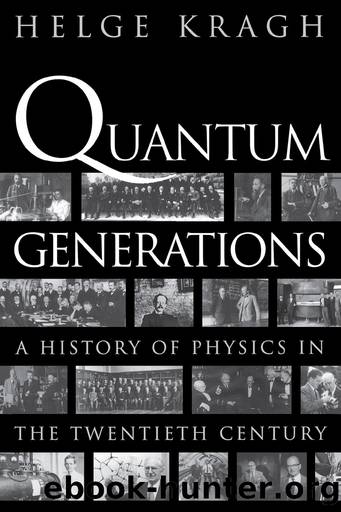Quantum Generations by Helge Kragh

Author:Helge Kragh
Language: eng
Format: epub
Publisher: Princeton University Press
Published: 2020-06-15T00:00:00+00:00
PHYSICS, DIALECTICAL MATERIALISM, AND STALINISM
Among the political weaknesses of Aryan physics (as well as related attempts in mathematics, chemistry, and biology) was that it could not appeal to an accepted philosophical foundation of National Socialism. There simply was no such foundation. National Socialism was built on action and emotion, not on a coherent system of ideas. This was contrary to the situation in the Soviet Union, where the regime was based ideologically on the socialist corpus of writings of Marx, Engels, and Lenin. From the earliest days of the new Soviet Union, philosophers found it important to analyze science from the point of view of the official Marxist philosophy, that is, the dialectical materialism that could be distilled from the works of Engels and Lenin. Marxist enthusiasts sought to promote a “proletarian science” that differed from the bourgeois science in terms of methods, aims, and approach. The movement attracted considerable philosophical and political interest, but failed to convince the physicists that they ought to change their science toward a more proletarian direction. In general, there were few political activists among Soviet scientists. According to a 1930 survey, the Soviet Union included about 25,000 “scientific workers,” among whom were some 1,000 physicists. Only 44 of the physicists were members of the Communist Party.
During most of the 1920s there were no serious conflicts between party philosophers and the physicists, but in the 1930s the debate sharpened, especially in connection with the question of the interpretation of quantum mechanics. It was not so much an attempt from the side of the regime to impose its view on the physicists as it was a conflict between physicists and philosophers, among philosophers themselves, and in some cases, among physicists themselves. Because many philosophers regarded themselves as the intellectual guardians of true Marxism-Leninism, their voices were politically more important than they would have been under normal, democratic circumstances. If it could be argued that a certain physical theory, or a certain interpretation of it, was “idealistic,” “subjective,” or “Machist” (related to the ideas of Ernst Mach), it might lead to a potentially dangerous situation. For example, the philosopher Alexander Maksimov claimed in 1939 that Einstein, Schrödinger, Bohr, Dirac, and Heisenberg were all “idealists of the Machian variety” and that their views of quantum physics were ideologically unacceptable. “The struggle for Bolshevism in science is the struggle for a fundamental reconstitution of science,” he declared (Vucinich 1980, 240). Party philosophers tried to engage the physicists in ideological discussions and to convince them about their errors, but they were not very successful. Many physicists simply ignored the philosophers and stayed away from questions concerning the relationship between physics and Marxism. To take up such questions might lead to difficulties and, after all, physics was much more interesting than philosophy. Others took up the challenge and argued, not unreasonably, that in order to criticize physics, one must understand physics; and the philosophers, they gleefully noted, did not. Or they argued that there were not, in fact, any contradictions between Marxist-Leninist dogma and current understandings of relativity and quantum physics.
Download
This site does not store any files on its server. We only index and link to content provided by other sites. Please contact the content providers to delete copyright contents if any and email us, we'll remove relevant links or contents immediately.
The Complete Stick Figure Physics Tutorials by Allen Sarah(7366)
Secrets of Antigravity Propulsion: Tesla, UFOs, and Classified Aerospace Technology by Ph.D. Paul A. Laviolette(5369)
Thing Explainer by Randall Munroe(3930)
The River of Consciousness by Oliver Sacks(3599)
The Order of Time by Carlo Rovelli(3188)
How To by Randall Munroe(3106)
A Brief History of Time by Stephen Hawking(3022)
I Live in the Future & Here's How It Works by Nick Bilton(2994)
What If?: Serious Scientific Answers to Absurd Hypothetical Questions by Randall Munroe(2700)
The Great Unknown by Marcus du Sautoy(2691)
Midnight in Chernobyl by Adam Higginbotham(2543)
Blockchain: Ultimate Step By Step Guide To Understanding Blockchain Technology, Bitcoin Creation, and the future of Money (Novice to Expert) by Keizer Söze(2493)
Networks: An Introduction by Newman Mark(2404)
The Meaning of it All by Richard Feynman(2353)
Easy Electronics by Charles Platt(2325)
The Tao of Physics by Fritjof Capra(2272)
Midnight in Chernobyl: The Untold Story of the World's Greatest Nuclear Disaster by Adam Higginbotham(2226)
Introducing Relativity by Bruce Bassett(2117)
When by Daniel H Pink(2114)
